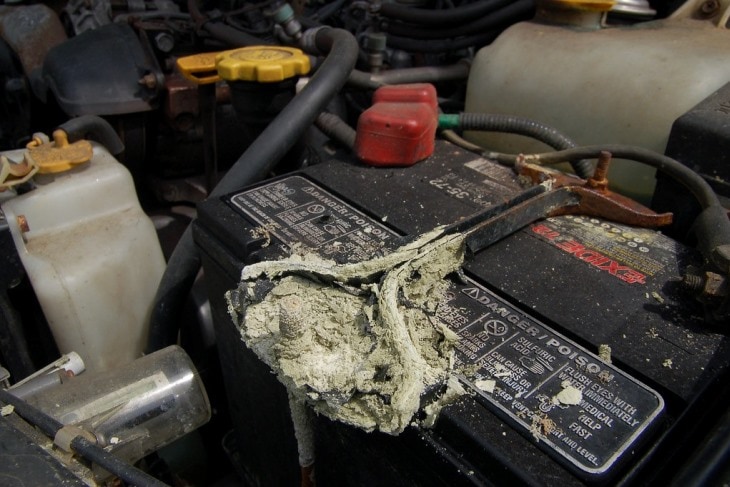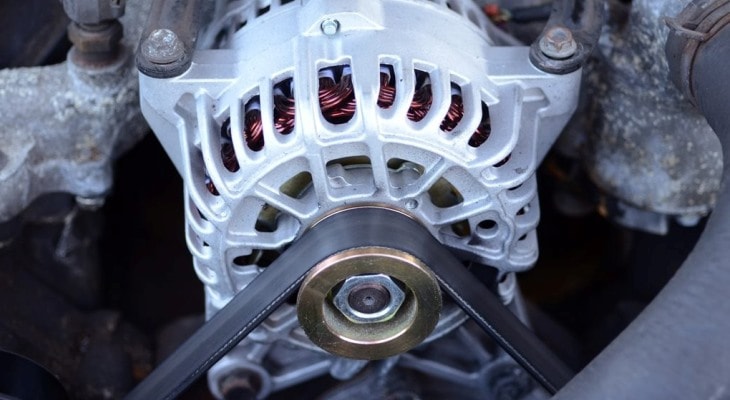It’s true that the battery and the alternator are both important parts of a car’s electrical system! If a battery is corroded, is that the fault of the alternator? Let’s see how a faulty alternator may affect the battery and what causes corroded batteries.
Table of Contents
Does a Bad Alternator Corrode Batteries?
The answer to this question is a little more complicated than a simple ‘yes’ or ‘no’. While a bad alternator may indirectly cause some battery corrosion, it is usually not the immediate culprit.
A failing alternator will drain the battery. Then, the alternator will overcharge the battery. This causes a dangerous excess of hydrogen gas. Too much hydrogen gas can cause corrosion on the battery terminals.
What is an Alternator?

The battery starts the engine, but the alternator keeps the car powered up once the engine is running. The alternator supplies all the electronic components in the vehicle with electrical charge and charges the battery while the car is running.
Alternators convert mechanical energy into the electrical energy your car needs to keep running. A running engine powers a drive belt that moves the pulley. The pulley then turns a rotor shaft which spins a set of magnets. These magnets generate alternating current (AC) power. The alternator’s rectifier converts AC power into DC power.
How Can I Tell If I Have a Bad Alternator?
It can be difficult to tell if there is a problem with the alternator or the battery. If either one fails, the car won’t start or won’t stay running for longer than a few minutes. Look for some of these other telltale symptoms of a failing alternator.
Problems with the Car Lights
The alternator powers the electrical parts of the vehicle, including the lights! It will either underpower the lights, causing them to be dim or flicker or overpower the lights, causing them to be too bright.
Malfunctioning Electronics
If your windows suddenly stop working or your instrument panel goes crazy, a faulty alternator may be to blame.
A Burning Smell
The alternator’s belt is close to the hot engine. Plus, an alternator that is working overtime will heat up. It may cause all the wires in the electrical system to heat up too. If you smell burning rubber or wires, it may be a sign that your alternator is going out.
The Car Is Stalling Frequently
Remember that trouble starting a car may be due to either a bad battery or a bad alternator. However, if the car is stalling a lot while it is running, that is usually the alternator’s fault. Its job is to create the power to keep the car running.
What Causes Car Battery Corrosion?

Car batteries are full of sulfuric acid and water. Battery corrosion is caused by a chemical reaction between escaped corrosive gasses and the copper on the battery terminals. There are a couple of ways the gas can reach the terminals.
The Battery Releases Too Much Gas
Even the most maintenance-free car batteries come equipped with tiny vents to let out extra gas. Depending on the location of the vents and airflow, some of this gas can make it to the battery terminals and cause corrosion.
Once a car battery is 5-6 years old, the construction starts to break down and even more gas is allowed to escape. Corrosion is a good sign that your battery needs to be replaced.
The Battery Is Overcharged
If the battery gets too much electrical charge, it will overheat. This can cause the liquid inside to expand and leak out as a gas that could corrode the battery.
Verdict
A faulty alternator may cause battery corrosion, but it usually isn’t the direct cause behind the problem. Look for other signs of a bad alternator to see if the alternator is really at fault. Otherwise, check the battery’s age and function to see if it needs to be replaced.

